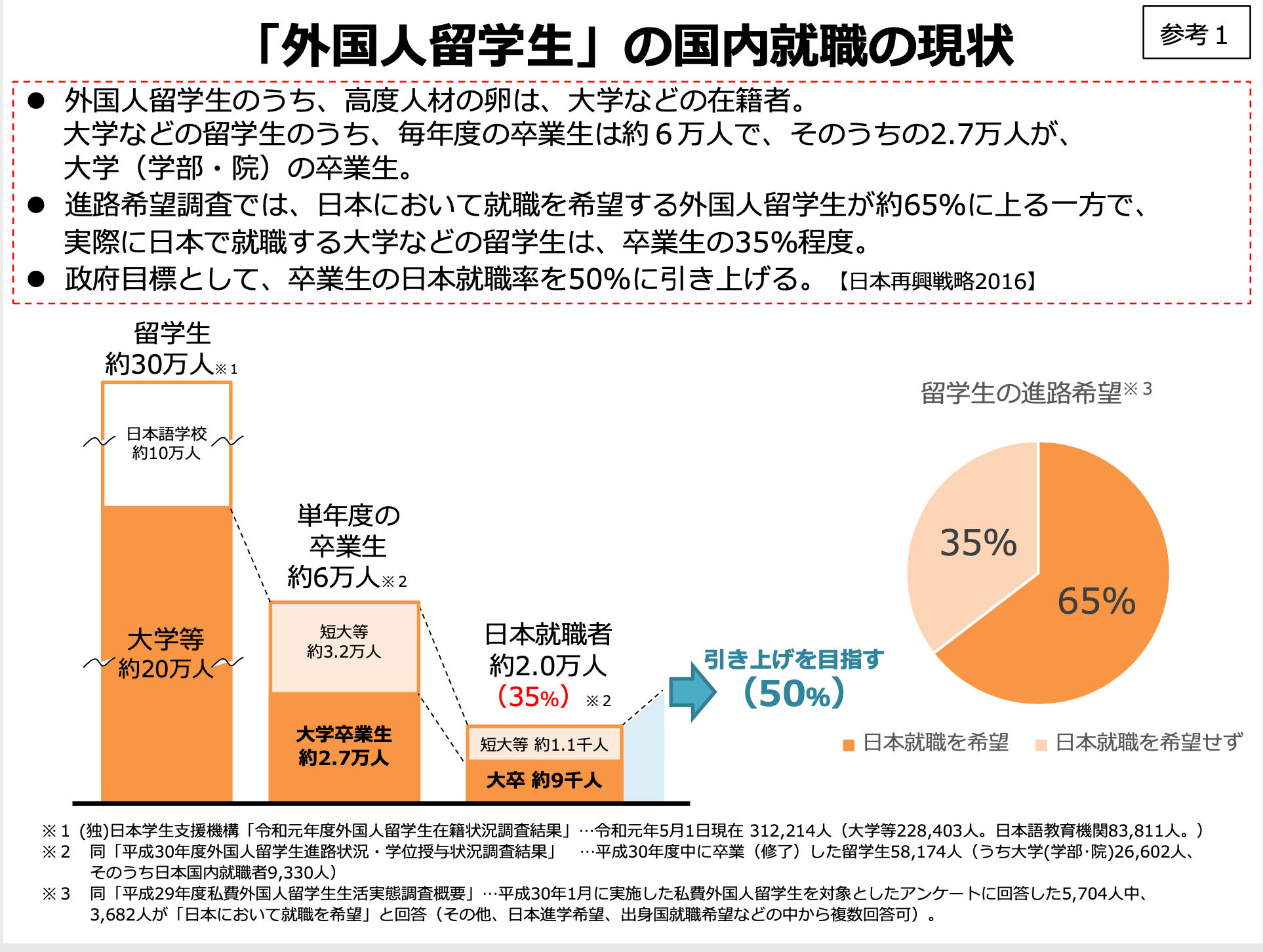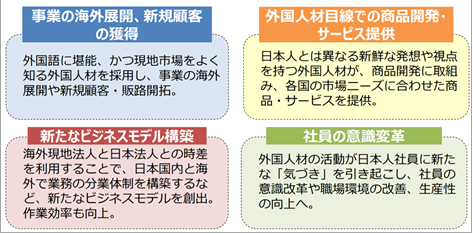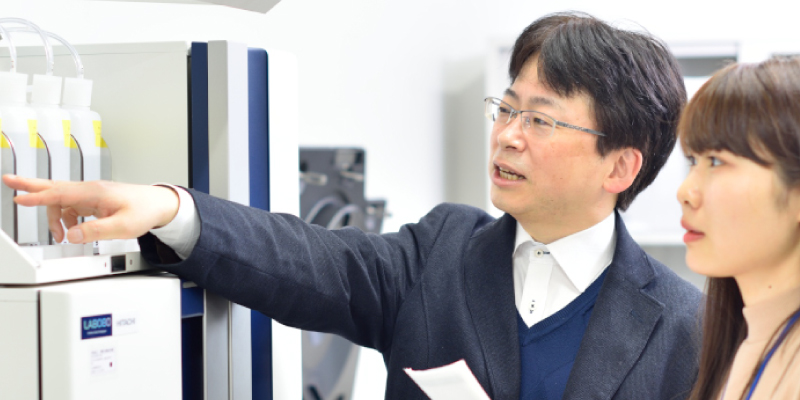メディカルバイオサイエンス学科
 坂井 伸彰(さかい・のぶあき)
坂井 伸彰(さかい・のぶあき)
Nobuaki Sakai
専門分野/キャリア支援、キャリア教育研究キーワード/国際共修、学習環境デザイン、外国人留学生
職位:教授
学位:修士(情報学)(関西大学)
- 関西大学大学院総合情報学研究科 博士課程満期退学
- 松下電器産業(現、パナソニック)株式会社、明治大学、名古屋大学国際教育交流センター特任講師、同大学学生支援センターキャリアサポート室長・准教授を経て本学へ
研究テーマ
日本で学ぶ外国人留学生や、日本で働く外国籍社員の方達に焦点を当て、主に以下の2点に関する研究を進めています。
(1)日本企業における外国人留学生の採用・育成の課題
日本企業における外国人留学生の採用や育成時の課題について、企業の事例を分析し、研究を行っています。
政府は「日本再興戦略2016」において、日本の高等教育機関で学ぶ外国人留学生の国内就職率を5割へと向上させることを目指しています。その一方、日本での就職を希望する外国人留学生が6割を超えると言われている中、2016年時点での就職率は約3割に留まっています(図1)。

図1:外国人留学生をめぐる国内就職の現状(厚生労働省「外国人留学生の国内就職の現状」より引用)
また、経済産業省は、外国人留学生等の外国人材を日本企業が採用する利点として、「事業の海外展開、新規顧客の獲得」、「外国人材目線での商品開発・サービス提供」、「新たなビジネスモデル構築」、「社員への意識変革」を挙げ、外国人の方々の採用や育成に注力している国内企業の事例を紹介しています(図2)。

図2:外国人材採用のメリット(経済産業省貿易経済協力局「高度外国人材活躍企業50社」資料より引用)
その一方、2016年度に東海地区の拠点を持つ企業136社にアンケート調査を行ったところ、留学生等の外国人材の採用に積極的な企業は全体の1割に留まっていました。外国人材の採用に積極的な企業からは、彼らの国際的なバックグラウンドからもたらされる多様な視点、語学力をはじめ、日本での留学経験を通じて強化された積極性や、物事や知識を吸収する意欲等を高く評価していることが分かりました。しかし、採用に消極的な企業からは、受入体制の不備、社内や取引先の理解不足、従業員の語学力不足等の課題に加え、留学生の持つ就業観が自社の採用方針と合わないこと等を課題視している様子が浮かび上がりました。
この結果を踏まえ、外国籍社員が定着・活躍している国内企業の事例について、現在、調査・分析を行っています。外国籍社員の方々をはじめ、職場の上司や先輩社員の方々、そして人事担当者の方達にインタビューを行い、どのような人事施策や職場環境の構築が外国籍社員に求められているのか、国内企業のダイバーシティ・インクルージョン推進の進展に寄与できるよう研究を進めています。
参照:
厚生労働省(2020)「外国人留学生の国内就職の現状」https://www.mhlw.go.jp/content/11655000/000689552.pdf (2021年4月23日確認)
経済産業省貿易経済協力局(2018)「高度外国人材活躍企業50社」https://www.meti.go.jp/press/2018/05/20180525002/20180525002-1.pdf (2021年4月23日確認)
(2)外国人留学生と日本で働くビジネスパーソンとの国際共修を目指した学習環境のデザインの検討
日本国内の大学では,グローバル人材育成の観点から,文化的背景の異なる者同士が学び合う教育実践が注目されています。このような教育実践は「国際共修」と呼ばれ,「言語や文化背景の異なる学習者同士が,意味ある交流(Meaningful Interaction)を通して多様な考え方を共有・理解・受容し,自己を再解釈する中で新しい価値観を創造する学習体験」(末松,2019)と定義付けられています。その一方,国内大学における国際共修は正課科目を中心に導入されていますが,その歴史は浅く,体系的な教授法が確立されておらず,研究としての要素に欠ける実践報告が散見されます。近年は,外国人留学生による(あるいは外国人留学生と日本人学生との協働による)企業との課題解決学習の実践事例も報告されていますが,留学生だけが学ぶのではなく,企業側の人材と共に学ぶことを目指した国際共修の実践研究は皆無に等しいのが現状です。
こうしたことを背景に,外国人留学生と企業側のビジネスパーソンとの国際共修を目指した教育活動を行うために必要となる指針を明らかにするため、「ワークショップ」の学習形態に着目し、実践的に研究を行っています。具体的には、1)参加者が発言し易くなる視覚的な仕掛け、2)上位関係に囚われず互いのことに配慮できるようなチームの設計、3)限定的な期待や固定観念に囚われず参加者一人ひとりへの理解が深まるプログラムの構築、4)序列を気にせず論点を整理するファシリテーターの育成等、ワークショップ運営上の留意点に着目し、事例研究を重ねながら検討を進めています。
参照:末松和子(2019).「国際共修の検証──文献リサーチを通して見えてくるもの──」.日本学生支援機構ウェブマガジン『留学交流』, 95, 1-12.
| 研究の応用領域 | 産官学連携で求めるパートナー |
|---|---|
| 企業や大学等における多文化共生環境の構築、大学生の国際的なキャリア形成を支援する教育プログラムの設計・開発 | 外国人留学生をはじめ、本学で学ぶ学生の教育や育成に関心を持つ企業や団体 |
Topics of research
We are continuing to conduct research focusing on international students studying in Japan and non-Japanese employees working in Japan.
1. Challenges in the Recruitment and Training of International Students at Japanese Companies
We are analyzing case studies and conducting research on the issues that Japanese companies face when recruiting and training international students.
As part of the Japan Revitalization Strategy 2016, the government aims to increase the number of international students studying at higher education institutions in Japan who are subsequently employed in the country to 50%. At the same time, while more than 60% of international students wish to find employment in Japan, the actual proportion of those who succeed in doing so was only about 30% in 2016.
The Ministry of Economy, Trade, and Industry provides examples of Japanese companies that are focusing on recruiting and training non-Japanese people. The Ministry of Economy, Trade, and Industry also provides the following advantages for Japanese companies that recruit international personnel, such as international students: “the expansion of the business overseas and the acquisition of new customers,” “the development of service provision and products from the perspective of non-Japanese personnel,” “the construction of new business models,” and “the changing of employee thinking.”
Furthermore, in fiscal year 2016, our questionnaire survey of 136 companies with bases in the Tokai region showed that only 10% of all companies were actively recruiting international students and similar groups. Companies that do recruit non-Japanese workers have found that they highly appreciate the international workers’ diversity of perspectives and language skills that come from their international backgrounds, assertiveness cultivated through their experience in studying abroad in Japan, and willingness to absorb knowledge and other things. However, companies that are reluctant to recruit non-Japanese personnel experience challenges such as inadequate systems, a lack of understanding within the company and from their business partners, and a lack of language skills among employees. In addition, there are also signs that international students' views on employment do not match companies' recruitment policies.
Based on these findings, we are currently conducting surveys and analyses of case studies of Japanese companies with currently active and firmly established non-Japanese employees. We are conducting interviews with non-Japanese employees, superiors, senior employees, and personnel managers at their workplaces. We are also conducting research to promote diversity inclusion among domestic companies and determining which personnel measures and workplace environments are required by non-Japanese employees.
Sources:
Ministry of Health, Labor and Welfare (2020) "The Current Status of Employment of Foreign Students in Japan"
https://www.mhlw.go.jp/content/11655000/000689552.pdf (Accessed on April 23, 2021)
The Trade and Economic Cooperation Bureau, Ministry of Economy, Trade and Industry (2018) "50 Enterprises Advanced in their Recruitment of Non-Japanese Personnel"
https://www.meti.go.jp/press/2018/05/20180525002/20180525002-1.pdf (Accessed on April 23, 2021)
2. Examining the Design of a Learning Environment Aimed at Facilitating Collaborative International Learning between International Students and Business Persons Working in Japan
From the perspective of global human resource development, universities in Japan are focusing on educational practices in which people from different cultural backgrounds learn from each other. These educational practices are called "collaborative international learning" and are defined as "learning experiences where learners with different linguistic and cultural backgrounds share, understand, and accept diverse concepts through meaningful interactions, creating new values while reinterpreting the self (Suematsu, 2019).” However, while collaborative international learning at universities in Japan has been introduced primarily in regular classes, its historically shallow systematic teaching methods have not been established. There are practice reports that lack elements of research. In recent years, there have been practice reports on case studies of problem-solving-based learning involving companies and international students (or collaboration between international students and Japanese students), but there has been no practical research on collaborative international learning with an aim that international students will learn and the company will learn in tandem with the students.
Based on this foundation, we are conducting practical research focusing on workshops as a form of learning in order to clarify the guidelines needed to conduct educational activities aimed at collaborative international learning between international students and business personnel. Specifically, we are conducting case studies focusing on points of concern in the operation of workshops, such as 1) visual devices that make it easier for participants to speak, 2) designing teams that allow participants to acknowledge each other regardless of their rank vis-a-vis their superiors, 3) building programs that deepen participants’ understanding of other participants without being bound by limited expectations or fixed ideas, and 4) developing facilitators that can organize relevant issues regardless of rank.
Sources:
Kazuko Suematsu (2019) "Validating Collaborative International Learning -What Can Be Seen in Research into the Literature," Online Magazine of the Japan Student Services Organization, "Ryugaku Koryu" No. 95 pp. 1-12.
主な業績論文等
- 坂井 伸彰(2021). 英語プログラムを含めた留学生支援体制の検討―留学生の進路・生活相談アンケートを基に―,名古屋大学国際教育交流センター紀要,8,17-26
- 坂井 伸彰(2020). 外国人留学生と日本で働くビジネスパーソンとの国際共修を目指したワークショップのデザインの検討, 留学生教育, 25, 61-69
- 坂井 伸彰 (2018). 企業価値を高める 外国人留学生の採用のポイント, 賃金事情, 2771, 46-51
- 坂井 伸彰 (2018). 日本企業における留学生採用の現状と課題, 留学交流, 84, 1 – 14
- 坂井 伸彰(2017). 「国際人材の採用に関するアンケート」調査報告 ―日本企業における外国人留学生等の国際学生の採用活動―, 名古屋大学国際教育交流センター紀要, 4, 15–26
- 坂井 伸彰(2017). 留学生の就職・キャリア支援, 岩城 奈巳・城所 佑委・高木 ひとみ・孝森 めぐみ・田中 京子・渡部 留美・浅川 晃広・酒井 崇・坂井 伸彰・和田 尚子編著, 国際教育交流担当者のためのガイドブック(pp.27-29) , 名古屋大学国際教育交流センター






